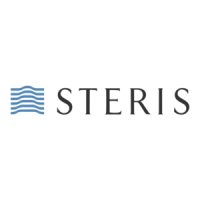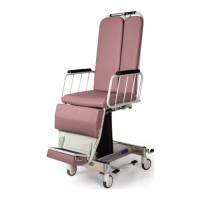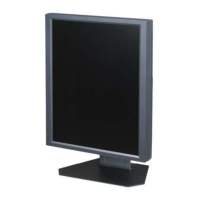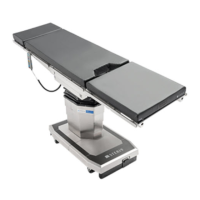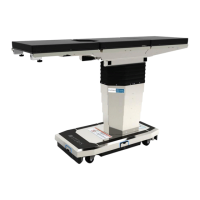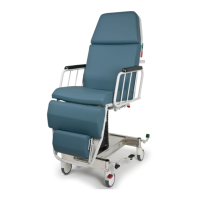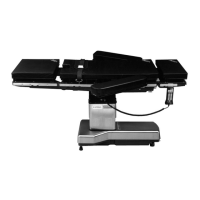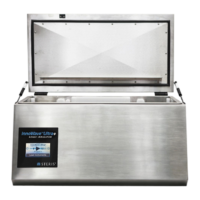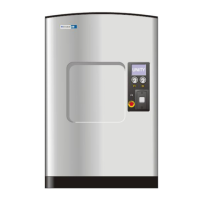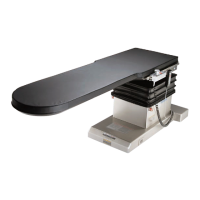Do you have a question about the Steris Vision 1300 Series and is the answer not in the manual?
Provides an overview of the manual's purpose, importance of safety, and contents.
Highlights important safety precautions and intended use of the equipment.
Specifies the intended applications and uses of the washer/disinfector.
Outlines the importance of preventive maintenance and STERIS service options.
Lists the safety requirements and standards the equipment meets.
Provides contact and manufacturing addresses for STERIS Corporation.
Introduces the importance of reviewing all safety precautions before operation.
Details specific warnings and cautions related to personal injury and equipment damage.
Explains various symbols found on the washer/disinfector components.
Defines symbols typically found on the equipment's identification nameplate.
Describes symbols related to shipping crates and storage environmental conditions.
Introduces technical information found on the equipment's identification nameplate.
Lists operating voltage, phase, frequency, and power requirements for the equipment.
Details the conditions under which the washer/disinfector is designed to operate.
Provides a checklist to ensure correct installation and operation of the equipment.
Discusses the importance of water type and cleaning chemistries for efficiency and equipment life.
Describes the specifications and usage of specific STERIS ultra concentrate chemicals.
Provides a general overview of the washer/disinfector's major components and controls.
Describes the features and operation of the washer/disinfector's chamber doors.
Details the location, function, and maintenance of the debris screen.
Explains the function and design of the traveler spray arms for chamber coverage.
Details the types and functions of the reservoirs used for detergents and rinse aid.
Introduces the PC-based control system and its operating cycles.
Explains the function of the bar code reader for automatic cycle identification.
Describes the dual touch screens for system interaction.
Introduces the four operating modes: Ready, Cycle, Supervisor, and Service.
Describes the default operating mode and access to other modes.
Explains how to put the unit into Standby mode.
Explains how to select and initiate cycles using the touch screen or bar code reader.
Describes the Supervisor mode for modifying parameters and configuring settings.
Explains the Service mode, restricted to qualified technicians for maintenance.
Details how to use touch pads to control the chamber doors.
Explains how to select and process different cycles using the touch screen.
Describes how to navigate menus and use various touch pad functions.
Explains how to acknowledge warning and alarm messages.
Details the function of the key selector for locking and unlocking the unit.
Explains the operation of the emergency stop pushbuttons for immediate system shutdown.
Describes the function of the emergency stop cables for immediate system shutdown.
Explains the Process Verification system for monitoring and documenting cycle parameters.
Introduces the different loading racks available for use.
Describes the Vision CW Container Rack for holding various containers.
Provides loading capacity and guidelines for the Vision CW Utensil Rack.
Details how to load the manifolded rack for instrument trays, with rotary spray arms.
Provides general guidelines and checks to perform before operating the equipment.
Details the procedure for operating the chamber doors.
Explains how to handle door obstructions.
Discusses the reservoirs, their types, and configuration for detergent use.
Explains the water recycling feature and its settings.
Provides guidelines and warnings for loading racks and items into the chamber.
Gives specific guidelines for loading the Vision CW Container Rack.
Provides loading capacity and guidelines for the Vision CW Utensil Rack.
Details how to load the manifolded rack for instrument trays, with rotary spray arms.
Provides instructions for loading surgical case carts, including locking doors.
General instructions on loading the washer/disinfector chamber.
Describes the typical cycle progression, parameter monitoring, and data viewing.
Details the Pre-Wash phase for the INSTRUMENT cycle.
Explains the Wash phase, including steps for INSTRUMENT cycle and other cycles.
Describes the Thermal Rinse phase for disinfection.
Explains the drying process, including floor tilting.
Provides instructions and safety warnings for unloading the processed load.
Explains the general purpose and benefits of using Standby mode.
Explains how to use Standby mode when a cycle is already running.
Explains how to interpret and respond to warning messages displayed on the screen.
Details how to respond to alarms, including silencing and acknowledging.
Provides instructions on how to stop or abort a running cycle.
Provides guidance on when to shut down the equipment.
Describes the sequence of operations after a power failure and restoration.
Details the procedure for using the emergency stop pushbuttons.
Details the procedure for using the emergency stop cables.
Provides general information about the pre-programmed operating cycles and parameter modification.
Explains how chemical injection is monitored for acceptance range.
Describes how Process Verification monitors and stores cycle parameters.
Introduces the Supervisor mode and its access security.
Details the steps required to log into the Supervisor mode.
Lists the available menus within the Supervisor mode for configuration.
Explains how to add, edit, or delete supervisor login names and passwords.
Describes the Cycles menu for creating and modifying cycles.
Details how to modify parameters of validated cycles.
Explains how to create customized cycles by copying existing ones.
Details how to modify parameters of customized cycles.
Explains how to assign bar code tag numbers to customized cycles.
Describes machine setup options for printer, PDF reports, language, and units.
Details how to print cycle data, all cycles, or configuration settings.
Explains how to configure reservoir settings like recycling count and chemical type.
Describes how to set up reminder messages for maintenance tasks.
Details how to save and transfer reports to a USB key.
Introduces the routine maintenance section and refers to safety precautions.
Provides general warnings and information about performing maintenance.
Presents a checklist and schedule for routine maintenance tasks.
Details the procedure for cleaning the debris screen.
Provides instructions for cleaning the exterior of the washer/disinfector.
Explains how to perform the DECONTAM cycle for cleaning and descaling.
Details the procedure for replacing chemical containers.
Explains how to change the printer paper roll and ink cartridge.
Describes how to inspect and clean the traveler spray arm assemblies.
Details how to clean the spray arm assemblies on the manifolded rack.
Explains how to verify the proper operation of the emergency stop cables.
Explains how to verify the proper operation of the emergency stop pushbuttons.
Introduces the troubleshooting section and refers to safety precautions.
Provides general warnings and guidelines for troubleshooting.
Describes the Emergency Stop alarm, its condition, and troubleshooting steps.
Details the Load Door Locking System Malfunction alarm and its resolution.
Details the Unload Door Locking System Malfunction alarm and its resolution.
Describes the Load Door Unlocked During Cycle alarm and troubleshooting.
Describes the Unload Door Unlocked During Cycle alarm and troubleshooting.
Details the Spray Arms Not Moving alarm and its causes.
Describes the Recirculation Process Malfunction alarm and troubleshooting.
Details the Motor Overload Tripped alarm and its resolution.
Describes the Sump Draining/Recycling Malfunction alarm.
Details the Water Recirculation Pressure Transmitter Defective alarm.
Describes the Water Recycling Malfunction alarm.
Details the Water Recirculation Temperature Too High alarm.
Describes the Water Recirculation Too Long to Heat alarm.
Details the Water Recirculation RTD Defective alarm.
Describes the Reservoir #1 Water Temperature Too High alarm.
Details the Reservoir #1 RTD Defective alarm.
Describes the Reservoir Overflow alarm.
Details the Reservoir #1 Hot Water Not Filling alarm.
Describes the Reservoir #1 Pure Water Not Filling alarm.
Details the Reservoir #2 Hot Water Not Filling alarm.
Describes the Reservoir #2 Cold Water Not Filling alarm.
Details the Reservoir #3 Hot Water Not Filling alarm.
Describes the Reservoir #1 Level Sensors Defective alarm.
Details the Reservoir #2 Level Sensors Defective alarm.
Describes the Reservoir #3 Level Sensors Defective alarm.
Details the Reservoir #1 Draining or Transfer Malfunction alarm.
Describes the Reservoir #2 Draining or Transfer Malfunction alarm.
Details the Reservoir #3 Draining or Transfer Malfunction alarm.
Describes the Chamber Pressure Abnormal alarm.
Details the Dosing System Communication Failure alarm.
Describes the Chemical #1 Low Level alarm.
Details the Chemical #2 Low Level alarm.
Describes the Chemical #3 Low Level alarm.
Details the Chemical #4 Low Level alarm.
Describes the Chemical #5 Low Level alarm.
Details the Compressed Air Not Detected alarm.
Describes the Reservoir #1 Too Long to Heat alarm.
Details the Water Recirculation Pressure Switch Defective alarm.
Describes the PV Chemical Injection alarm.
Details the PV Chemical Injection with Pump #2 Out of Range alarm.
Describes the PV Chemical Injection with Pump #3 Out of Range alarm.
Details the PV Thermal Temperature Out of Range alarm.
Describes the Over Temperature Switch Tripped alarm.
Details the Dosing System Software Outdated alarm.
Describes the Analog Sensor Calibrations reset alarm.
Details the Cycles Returned to Factory Default Values alarm.
Describes the Warning for Hot Water Pressure Below Requirement.
Details the Warning for Pure Water Pressure Below Requirement.
Describes the Warning for Hot Water Pressure Above Requirement.
Details the Warning for Pure Water Pressure Above Requirement.
Describes the Warning for Cold Water Pressure Below Requirement.
Details the Warning for Cold Water Pressure Above Requirement.
Describes the Warning for Cycle Parameters Reset to Default.
Details the Warning for Chemical Injection Rates Reset to Default.
Describes the Warning for Temperature Not Reached in Reservoir #1.
Details the Windows message indicating SterisHMI.exe is not responding.
Describes issues with the bar code reader accessory and troubleshooting.
Details troubleshooting for the chamber not draining properly.
Describes troubleshooting for chemical leaks from the dosing system.
Details troubleshooting for a blank red screen with an error message.
Describes troubleshooting steps when the door fails to open.
Details troubleshooting for door obstructions.
Describes troubleshooting for doors not opening completely.
Details troubleshooting for doors opening/closing too quickly.
Describes troubleshooting for doors opening/closing slowly or vibrating.
Details troubleshooting for excessive vapor from the safety damper.
Describes troubleshooting for excessive vapor exhausting from doors.
Details troubleshooting for foam in the chamber or reservoirs.
Describes troubleshooting for the floor tilting system.
Details troubleshooting for printer output issues.
Describes troubleshooting for incomplete drying.
Details troubleshooting for insufficient water to traveler spray arms.
Describes troubleshooting for insufficient water to manifolded racks.
Details troubleshooting for the interior light not working.
Describes troubleshooting for items coming out dirty at the cycle end.
Details troubleshooting for manifolded rack spray arms not turning.
Describes troubleshooting for the absence of audible signals.
Details troubleshooting for no display on the touch screens.
Describes troubleshooting for a noisy drying fan.
Details troubleshooting for a noisy exhaust fan.
Describes troubleshooting for printer paper take-up issues.
Details troubleshooting for phases stopping without apparent reason.
Describes troubleshooting for the printer not working.
Details troubleshooting for erratic printer printouts.
Describes troubleshooting for the printer working but not printing.
Details troubleshooting for an abnormally noisy recirculation pump.
Describes troubleshooting for a malfunctioning touch screen.
Details troubleshooting for slow traveler movement.
Describes troubleshooting for vibrating travelers.
Details troubleshooting for water leaks from the washer/disinfector.
Lists consumables and replacement parts with their part numbers.
| Brand | Steris |
|---|---|
| Model | Vision 1300 Series |
| Category | Medical Equipment |
| Language | English |
